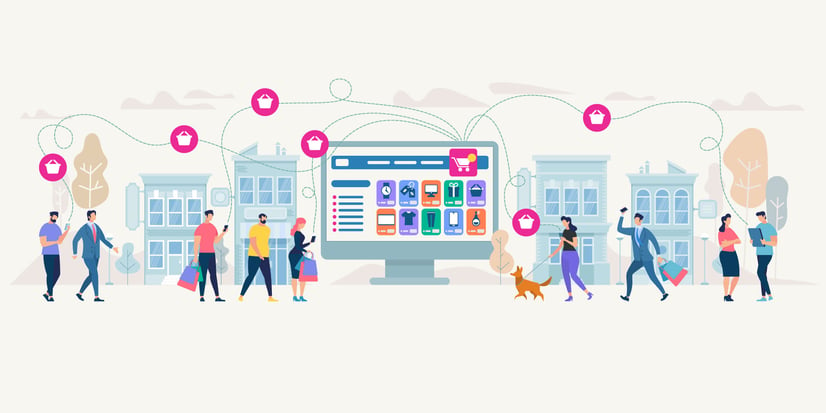Make your retail business more resilient with eCommerce & the Cloud

While eCommerce and cloud technologies are not new, they've become more and more important to guarantee the survival of retail businesses. During the Covid-19 pandemic, for example, big brands had to quickly overhaul their eCommerce experiences, and some smaller retailers launched online buying for the very first time.
Consumers were quickly to adapt too and change their purchasing behavior, even in countries like Italy and Spain, where eCommerce usage rates have been some of the lowest in Europe.
Building for the future
As consumer comfort with online shopping continues to grow, retailers will be expected to continue stepping up their digital experiences and make their technology more intuitive and ubiquitous. This trend is reflected in increasing investment in retail technology and the cloud. Inditex, a Spanish multinational and multi-brand fashion company, for example, plans to accelerate and broaden its forward-looking digital transformation strategy, investing €1 billion in bolstering its online business and a further €1.7 billion in upgrading the integrated store platform.
How to make cloud and eCommerce work for your business
During the Covid-19 crisis, cloud deployments have proven critical in enabling businesses to continue operating and quickly adapt their workloads and processes, as well as support remote workforces. With such compelling real-life experience in mind, here are three steps every retailer can take to better serve their customers and make their business more resilient:
1. Bridge the online-offline gap
Until recently, we wouldn’t even think of buying certain items online without seeing them and trying them out first. Take spectacles, a mattress, or even a cake. The average consumer would want to experience these products in person before committing to a purchase. But that no longer needs to be the case as retailers find new ways to bring the shopping experience into consumers’ homes.
Retailers who employ unified commerce platforms, which unite the different channels within a single software solution and database, are better equipped to launch digital experiences with functionality that bridges online and offline, such as click and collect. A unified commerce technology platform also enables you to keep tabs on sales, stock and customer preferences in real time, no matter the sales channel.
2. Be prepared to scale
Many retailers have seen their online sales skyrocket, but some were unable to keep up with demand as they struggled to handle the increase in traffic and sales. How has your online store coped? Would it be able to handle a sudden boost in traffic, or would it crash and leave your customers disappointed?
Today, retailers need to be prepared for unpredictable spikes in online business, at any time – not just on Black Friday and Christmas Eve. An effective strategy involves moving to a modern, flexible, cloud-based commerce platform that can quickly shrink or expand as needed, and handle peaks in traffic with ease.
3. Adapt to consumers’ changing needs
When you are using cloud-based technology, you can also take advantage of all the innovation happening in the cloud. Especially during times of change, this agility can enable you to not only see, but also respond to consumers’ desires. Demand forecasting and modeling tools can help you predict and prepare for significant consumer behavior changes changing your product mix, merchandising, pricing strategies and even messaging. Data analytics and machine learning tools can help you reduce waste and overhead. AI can also help create better customer experiences with tools such as personalized recommendations, and automate customer support with virtual agents who can answer frequently asked questions and direct consumers’ inquiries 24/7.
With consumer shopping habits changed irrevocably, to stay in business, retailers must continue to do what they have always done, which is to listen to their customers’ demands and deliver the products, services and experiences they need. Today, digital transformation can help you to respond effectively – allowing you to shift to online, implement cloud technologies that improve scalability and agility, and give you the insights you need to offer your customers exactly what they want at exactly the right moment in time.

